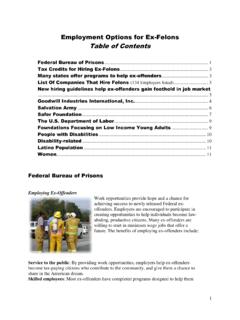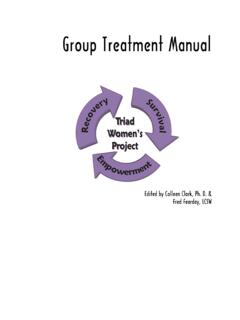Transcription of Course Syllabus - sph.umn.edu
1 Course Syllabus PubH 6535 Managerial Accounting in healthcare Organizations Spring 2013 Credits: 3 Meeting Days/ Time/Place: On-line Instructor: Betsy David, CPA, MHA Office Address: On-line Office Phone: Cell (651) 717-8988 Fax: (612) 626-8328 E-mail: Office Hours: By Appointment Weekly Chat Sessions TBD I. Course Description This Course shall provide an introduction to accounting and financial management and serves as a foundations Course in financial management for healthcare organizations. Managerial Accounting is the first of four courses in financial management and serves as a prerequisite for more advanced finance courses that are in the health management curriculum.
2 The primary objective of this Course is to impart administrative/managerial knowledge and financial / accounting theory and technique required in managing healthcare organizations within today s evolving environment. The elements of this Course will teach the fundamental concepts of healthcare finance, including both accounting and financial management principles with emphasis on the current financial environment in which providers operate. The primary purpose of this Course is to present the basic accounting concepts and financial management techniques ( cost allocation, time value of money, pricing and service decisions, budgeting) that are most critical to managerial decision making within healthcare organizations.
3 This Course is constructed in such a manner to assist each student in the development of their individual managerial skills, consistent with the National Center for healthcare Leadership (NCHL) Competency Model Demonstration, in which the School of Public health is a participant. II. Course Prerequisites Prior accounting or financial Course work or experience is helpful but not necessary. Those students that have not taken undergraduate courses in accounting or financial management are encouraged to read Accounting for Dummies by John A. Tracy, CPA. Students who have not used Microsoft Excel are encouraged to acquire John Walkenback s book Excel 2007 Bible and become proficient in the application of Excel.
4 III. Course Goals and Objectives Students successfully completing this Course will be able to: Interpret and analyze financial statements and make informed management decisions (NCHL Competency ) Describe the distinct difference between the financial characteristic of non-profit and for-profit healthcare Understand cost classifications encompassing fixed and variable costs (NCHL Competency ) Understand financial techniques such as breakeven analysis, net present value analysis and internal rate of return analysis in evaluating capital investments Comprehend the methods and approaches for cost allocation including activity based costing Implement strategic budgeting methods and operational planning principles.
5 Develop operating proforma statements and budgets for healthcare organizations. Manage budgets and organizational assets (NCHL Competency ) Establish and monitor performance benchmarks/indicators (NCHL Competency ) Explain organizational financial metrics and reports (NCHL Competency ) Utilize benchmarks to understand causality in financial data (NCHL Competency ). Prepare effective written business cases or presentations (NCHL Competency ). IV. Methods of Instruction and Work Expectations This Course will be taught on line, providing a peer-learning and collaborative atmosphere as professionals and colleagues interact in in a stimulating learning environment.
6 Please consider this Syllabus as a work plan designed to achieve desired outcomes. At all times, full participation and involvement is encouraged to allow each student to develop a competence and mastery of the concepts and materials related to financial management . The Course consists of 14 on line lessons, or weeks. There are readings, discussions, and assignments for each lesson. Begin with Week 1. You may work ahead of you wish, but note that this is not a work-at-your-own-pace Course . There are specific due dates throughout the semester. Each week there will be at a minimum a one hour period where the instructor will be available utilizing on-line CHAT which will allow the students to ask questions, have dialog and further the information exchange in a live on-line forum.
7 The time for this will be set after discussion with the students at the beginning of the term to attempt to make this access able by most if not all of the students. The instructor will also work with individual students on an as needed basis depending on schedule. V. Course Text and Readings There are two required texts for this Course : healthcare Finance: An Introduction to Accounting and financial management , louis C. Gapenski, 5th Edition, health Administration Press. Cases in health care Finance, louis C. Gapenski, 4th Edition, health Administration Press. V. Course Outline/Weekly Schedule Course Start Date Topic Readings Assignment Points Due Dates 16-Jan Intro.
8 To healthcare Finance Introduction Ch. 1 Introductions & Organizational financial Situation 5 and 15 23-Jan 23-Jan financial Environment Ch. 2 , , , and Q 12 P 20 30-Jan 30-Jan Income Statement Ch. 3 , , Q 16 P 30 6-Feb 6-Feb Balance Sheet & Cash Flow Ch. 4 , , Q 12 P 20 13-Feb13-Feb Reading & Interpretation financial Statement Interpretations Analysis #1 50 20-Feb20-Feb Case Review Case Book Primary Case: 1 or 2 Discussions 50 27-Feb27-Feb Cost & Profit Behavior Ch. 5 , and Q 10 P 20 6-Mar 6-Mar Cost Allocation Ch.
9 6 and Q 18 P 20 13-MarBREAK MARCH 16 - 24TH SPRING BREAK 27-Mar Price & Service Decisions Discussions P:10 and 20 3-Apr 3-Apr Case Review Case Book Secondary Case: 3, 4, 5, 6, and 7 44 10-Apr 10-Apr Budgeting Ch. 8 Q 10 P 10 17-Apr 17-Apr Time Value Analysis Ch. 9 , , , Q 4 P 30 24-Apr 24-Apr financial Risk & Required Return Ch. 10 , Q 4 P 10 1-May 1-May Business Plan Moodle Final Exam (1 - 8) Business Plan Budget Final 50 Business Plan 50 8-May 5152562050505050 Final Exam (Chapters 1 - 8)50546 VII.
10 Evaluation and Grading financial Business PlanTotal financial Statement Interpretation Primary Cases Review Secondary Case ReviewResponse to Individual Questions & Problems Pricing DiscussionPersonal Introduction and Situational Summary Organizational financial health CASES: The cases are designed to test the students: (10 understanding an application of financial and managerial concepts and tools; (2) critical thinking skills; (3) problem solving and analytical skills; and (4) ability to work with colleagues. To enhance the students understanding of the case topics, the pedagogy will be as follows: (1) Prior to the assignment of the cases, a prepared lecture dedicated to the case and the skills and concepts necessary to successfully solve the case will be provided.)



